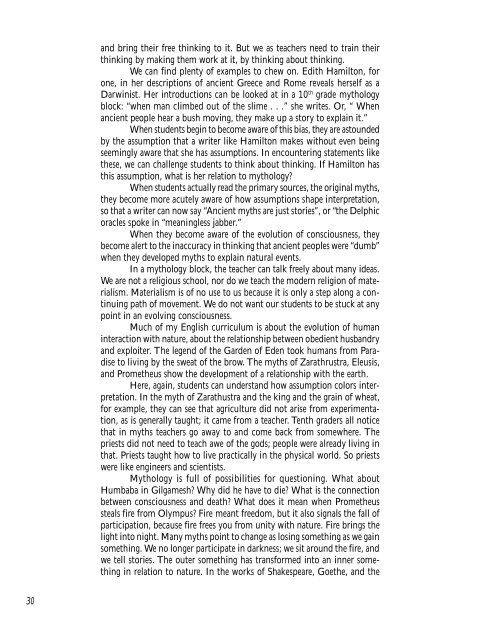Colloquium on English - Research Institute for Waldorf Education
Colloquium on English - Research Institute for Waldorf Education
Colloquium on English - Research Institute for Waldorf Education
You also want an ePaper? Increase the reach of your titles
YUMPU automatically turns print PDFs into web optimized ePapers that Google loves.
30<br />
and bring their free thinking to it. But we as teachers need to train their<br />
thinking by making them work at it, by thinking about thinking.<br />
We can find plenty of examples to chew <strong>on</strong>. Edith Hamilt<strong>on</strong>, <strong>for</strong><br />
<strong>on</strong>e, in her descripti<strong>on</strong>s of ancient Greece and Rome reveals herself as a<br />
Darwinist. Her introducti<strong>on</strong>s can be looked at in a 10 th grade mythology<br />
block: “when man climbed out of the slime . . .” she writes. Or, “ When<br />
ancient people hear a bush moving, they make up a story to explain it.”<br />
When students begin to become aware of this bias, they are astounded<br />
by the assumpti<strong>on</strong> that a writer like Hamilt<strong>on</strong> makes without even being<br />
seemingly aware that she has assumpti<strong>on</strong>s. In encountering statements like<br />
these, we can challenge students to think about thinking. If Hamilt<strong>on</strong> has<br />
this assumpti<strong>on</strong>, what is her relati<strong>on</strong> to mythology?<br />
When students actually read the primary sources, the original myths,<br />
they become more acutely aware of how assumpti<strong>on</strong>s shape interpretati<strong>on</strong>,<br />
so that a writer can now say “Ancient myths are just stories”, or “the Delphic<br />
oracles spoke in “meaningless jabber.”<br />
When they become aware of the evoluti<strong>on</strong> of c<strong>on</strong>sciousness, they<br />
become alert to the inaccuracy in thinking that ancient peoples were “dumb”<br />
when they developed myths to explain natural events.<br />
In a mythology block, the teacher can talk freely about many ideas.<br />
We are not a religious school, nor do we teach the modern religi<strong>on</strong> of materialism.<br />
Materialism is of no use to us because it is <strong>on</strong>ly a step al<strong>on</strong>g a c<strong>on</strong>tinuing<br />
path of movement. We do not want our students to be stuck at any<br />
point in an evolving c<strong>on</strong>sciousness.<br />
Much of my <strong>English</strong> curriculum is about the evoluti<strong>on</strong> of human<br />
interacti<strong>on</strong> with nature, about the relati<strong>on</strong>ship between obedient husbandry<br />
and exploiter. The legend of the Garden of Eden took humans from Paradise<br />
to living by the sweat of the brow. The myths of Zarathrustra, Eleusis,<br />
and Prometheus show the development of a relati<strong>on</strong>ship with the earth.<br />
Here, again, students can understand how assumpti<strong>on</strong> colors interpretati<strong>on</strong>.<br />
In the myth of Zarathustra and the king and the grain of wheat,<br />
<strong>for</strong> example, they can see that agriculture did not arise from experimentati<strong>on</strong>,<br />
as is generally taught; it came from a teacher. Tenth graders all notice<br />
that in myths teachers go away to and come back from somewhere. The<br />
priests did not need to teach awe of the gods; people were already living in<br />
that. Priests taught how to live practically in the physical world. So priests<br />
were like engineers and scientists.<br />
Mythology is full of possibilities <strong>for</strong> questi<strong>on</strong>ing. What about<br />
Humbaba in Gilgamesh? Why did he have to die? What is the c<strong>on</strong>necti<strong>on</strong><br />
between c<strong>on</strong>sciousness and death? What does it mean when Prometheus<br />
steals fire from Olympus? Fire meant freedom, but it also signals the fall of<br />
participati<strong>on</strong>, because fire frees you from unity with nature. Fire brings the<br />
light into night. Many myths point to change as losing something as we gain<br />
something. We no l<strong>on</strong>ger participate in darkness; we sit around the fire, and<br />
we tell stories. The outer something has trans<strong>for</strong>med into an inner something<br />
in relati<strong>on</strong> to nature. In the works of Shakespeare, Goethe, and the

















